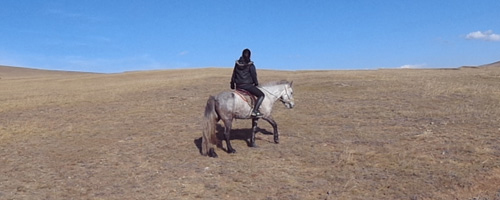|
 |
|
STEPPE BY STEPPE: A trekking guide rides her horse across the Mongolian landscape (JOSEPH HALVORSON) |
Genghis Khan once said, "It is easy to conquer the world from the back of a horse."
With this in mind, I confidently mounted my first Mongolian horse at a camp two hours outside of Ulan Bator and settled into the wooden-framed saddle.
"Choo!" I shouted, using the Mongolian command word for "Go."
The horse promptly responded by turning its head and biting me on the ankle.
I made a note to cancel any invasion attempts scheduled for that afternoon, and tried again. The horse swayed to the side and began to trot at a leisurely pace while my guide and travel partner galloped ahead.
Several hours into that bumpy first ride, I began to question my vacation choice. It was China's weeklong National Day holiday (October 1-7), and there was still much of the country I had yet to see. Hangzhou offered a famously beautiful lake; Shanghai promised an exciting metropolis; Xi'an allured with its iconic Terracotta Warriors; and Qingdao tempted with beer and a beach.
Instead, I chose to visit one of the world's least densely populated countries in order to avoid the notorious crowds that are associated with China's national holidays, when millions of workers and tourists pack all forms of transportation to visit their hometowns and cultural landmarks.
I booked a ticket on the Trans-Mongolian Railway for a 33-hour train ride to the Mongolian capital. My departure date fell on the first day of the "Golden Week" holiday, so I stayed awake the night before and took a cab to arrive at the train station at 5 a.m., before thousands of others who would arrive later that morning.
Standing in line at the platform I met another American who had utilized the same strategy for catching the train on time. He groggily asked me if I was also heading to Ulan Bator, and I nodded my head.
"Me too," he said. "Wanna ride horses?"
I agreed. "Sure."
The first 14 hours of that train ride passed in a deep sleep. We crossed the border at midnight and were awoken four times by immigration agents demanding separate documents. Outside the window uniformed border guards marched back and forth along the length of the train, pausing intermittently to stare intensely into the windows at sleepy, creeped-out passengers.
No one to my knowledge was detained that night—at least not my cabin mates, two cheery New Zealand "Kiwis" and an older Canadian traveling with a tour group.
The next morning I had breakfast in the dining car with my new American friend, a 27-year-old war veteran from California. A dozen Mongolian men soon followed, sat down at three tables, and ordered tall glasses of beer and several bottles of Chinggis vodka.
It wasn't long before we were invited to drink with them. My friend exchanged greetings with the group in Russian, which naturally called for a toast.
Several "toasts" later, someone turned up the volume on a pair of speakers playing Eastern European pop music, and the men stood up to dance wildly amongst each other in the aisle. I joined in to the best of my ability.
The party dispersed and the train arrived in Ulan Bator a few hours later. My friend and I checked into a hostel and reserved a horse riding tour for the following day.
The company provided traditional Mongolian accommodations: round tent-like structures called a yurt, or ger, with a furnace in the center to heat the room by burning camel dung (odorless, thankfully).
Before the first day of riding we had a warm meal of noodles and goat meat. Outside a light snow blanketed the hills surrounding the camp, and our team of horses slipped around on shaky hooves as they came to meet us.
We then set out for a two-day trip to a Buddhist monastery 25 km away. My horse stubbornly kept to a slow and steady gait, so my travel buddy took it upon himself to periodically steer his horse behind us and slap mine on the rear end, sending it into a terrified sprint.
When I had pulled ahead of my two travel companions, enjoying the peaceful atmosphere of the steppes, a pair of wild dogs began barking from atop a hill. They were running at full speed in my direction.
I struck my horse in the ribs. "Choo!"
The horse was unconcerned, ignorant of the dangers of rabies. As the dogs closed in, I kicked harder. When they were close enough to show off their snarling teeth, I conjured my inner conqueror enough to whip my horse into a mad dash, leaving the dogs behind to harass our companions in the distance.
When we finally arrived at the monastery, I gave thanks to Buddha and made a private pledge to leave horse riding to the experts.
A few days later I returned to Beijing, where the population of my district alone nearly surpasses that of the entire country of Mongolia.
I've traded my horse for a bicycle, and the wild dogs for wild drivers. Weaving through these busy streets at rush hour, I can reach my destination smoothly.
It is easy to conquer Beijing from the back of a bike.
The author is an American living in Beijing
Email us at: zanjifang@bjreview.com | 